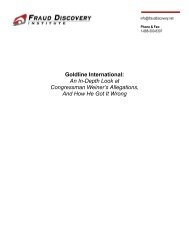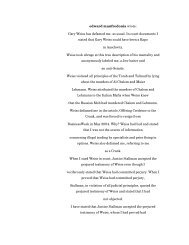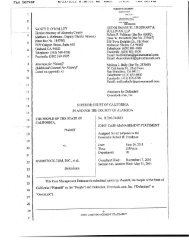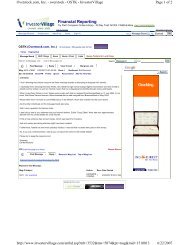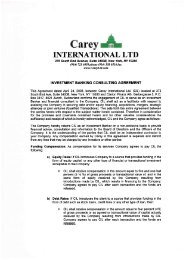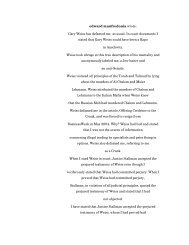motion to compel - White Collar Fraud
motion to compel - White Collar Fraud
motion to compel - White Collar Fraud
You also want an ePaper? Increase the reach of your titles
YUMPU automatically turns print PDFs into web optimized ePapers that Google loves.
" 1<br />
2<br />
3<br />
4<br />
5<br />
6<br />
7<br />
8<br />
9<br />
10<br />
11<br />
12<br />
13<br />
14<br />
15<br />
16<br />
17<br />
18<br />
19<br />
20<br />
21<br />
22<br />
23<br />
24<br />
25<br />
26<br />
27<br />
28<br />
Office of<br />
DISTRICT ATTOHffjY<br />
Alamedi County J v<br />
31<br />
norms, for trivial invasions afford no cause of action." Pioneer, supra, 40 Cal. 4th at 370-71 (emphasis<br />
added) (quoting Hill v. National Collegiate Athletic Assn. (1994) 7 CaUth 1, 36-37)).<br />
Assuming a claimant satisfies the three-part test, the Court in Pioneer went on <strong>to</strong> hold that "that<br />
[the privacy] interest must be measured against other competing or countervailing interests in a<br />
'balancing test."1 Pioneer, supra, 40 Cal. 4th at 371 (quoting Hill, supra, 1 Cal.4th at 37). Discovery<br />
r><br />
that is alleged <strong>to</strong> result in an invasion of privacy must '"be evaluated based on the extent <strong>to</strong> which it<br />
furthers legitimate and important competing interests.' .... Protective measures, safeguards and other<br />
alternatives may minimize the privacy intrusion. 'For example, if intrusion is limited and confidential<br />
information is carefully shielded from disclosure except <strong>to</strong> those who have a legitimate need <strong>to</strong> know,<br />
privacy concerns are assuaged.1" Pioneer, supra, 40 Cal. 4th at 371 (citations omitted) (quoting Hill,<br />
supra, 7Cal.4that38).4<br />
2. Disclosure of Contact Information on Potential Witnesses Who Have Already<br />
Been Named In Discovery Does Not Implicate Privacy Rights.<br />
The legal flaws in Defendant's apparent position are evident upon application of the Pioneer<br />
framework. Assuming arguendo that Defendant has standing <strong>to</strong> assert the privacy interests of former<br />
employees, it cannot satisfy the remaining two elements of the Pioneer test.<br />
First, although contact information such as addresses and telephone numbers are generally<br />
regarded as private, it is far from certain that Defendant's former employees would harbor a<br />
"reasonable expectation of privacy under the particular circumstances" of this case. Pioneer, supra,<br />
40 Cal. 4th at 371. This is not a dispute between private litigants; it is a law enforcement action brought<br />
by public officials on behalf of the People of California. Under these circumstances, there is no reason<br />
<strong>to</strong> assume that the former employees -who are no longer in an employment relationship with<br />
Overs<strong>to</strong>ck — would object <strong>to</strong> disclosure of their contact information. Cf. Puer<strong>to</strong>, supra, 158 Cal. App.<br />
4th at 1252-53 (the generally private nature of "residential telephone and address information ... does<br />
not mean that the individuals would not want it disclosed under these circumstances").<br />
4 Although Pioneer accepted the use of an "opt-out" letter under the facts of its case, it did not impose an op<strong>to</strong>ut<br />
requirement. And for the reasons discussed in Part H.B., infra, no such letter is warranted here.<br />
-7- CaseNo.RGlO-546833<br />
MPA IN SUPPORT OF MOTION TO COMPEL FURTHER INTERROGATORY RESPONSES



